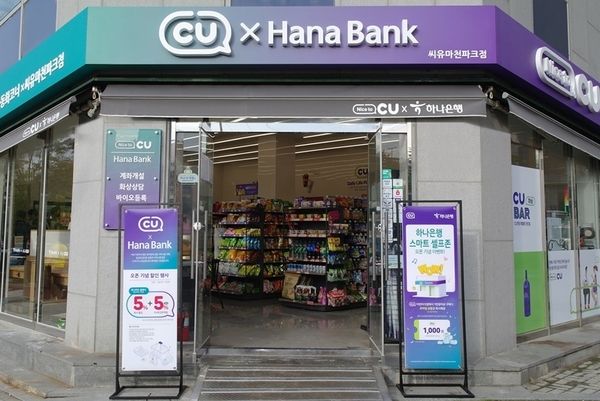
Financial services, drone delivery possible at convenient stores
BGF Retail, which runs South Korea’s convenience store chain CU, opened a store in eastern Seoul this week where customers can deal with banking services.Under the business alliance with Hana Bank, the new-concept store has a space dedicated to financial services like opening an account, issuing a debit card, and reissuing a passbook.The two outfits inked a partnership last month to set up such hybrid stores, which are designed to offer roughly 50 banking services through video calls.“Simple banking services are available around the clock. Opening an account and issuing a debit card are possible between 9 a.m. and 10 p.m. because Hana Bank officials should talk with clients,” BGF Retail representative You Cheol-hyun told Korea News Plus.“We are quite sure that clients will be happy with the special store because there are no bank branches around. After checking the customer response, we plan to increase the number of similar stores,” he said.This is not the first time for Korean convenience stores to come up with innovative services.Earlier this month, Korea Seven, a subsidiary of Lotte Group, which manages the 7-Eleven brand here, disclosed its plan to launch a pilot run of drone delivery services this year.Toward that end, BMW America will design the drone station, and U.S. manufacturer EVA will produce it, according to Korea Seven.Another brand GS25 carried out a test run of drone delivery services last year at Cheju, the country’s southernmost island.Observers point out that the stiff rivalry among domestic stores leads to the launch of unprecedented services.According to the Korea Association of Convenience Store Industry, there are around 43,000 convenience stores across the country. Such brands as CU, GS25, and 7-Eleven compete head-to-head.“I think that the proper number of convenience stores in Korea would be around 12,000. In other words, the country’s convenience store market has already hit the saturation mark,” Leaders Index CEO Park Ju-gun said. It is a business tracker based in Seoul.“Hence, players in the business pull out all the stops to beat its rivals with innovative services.”He expected that a mounting number of Korean companies would introduce cashier-less stores in the future, just like the Amazon Go stores in the United States.The first Amazon Go store opened in 2018 in Seattle, which enables shoppers to just walk out after picking up items without having to check out.키워드
이 기사를 공유합니다
Kevin Chung
(jumphigher55@aol.com)

